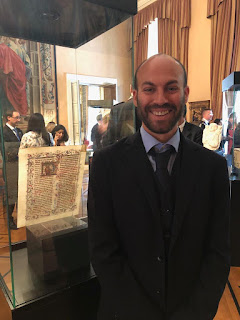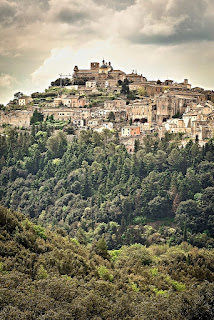Wednesday, February 20, 2019 -  2019 Interdisciplinary Art Crime Conference,2019 Postgraduate Certificate Program,armed conflict,art crime,art crime in war,conflict antiquities,Samuel Hardy
2019 Interdisciplinary Art Crime Conference,2019 Postgraduate Certificate Program,armed conflict,art crime,art crime in war,conflict antiquities,Samuel Hardy
 No comments
No comments
 2019 Interdisciplinary Art Crime Conference,2019 Postgraduate Certificate Program,armed conflict,art crime,art crime in war,conflict antiquities,Samuel Hardy
2019 Interdisciplinary Art Crime Conference,2019 Postgraduate Certificate Program,armed conflict,art crime,art crime in war,conflict antiquities,Samuel Hardy
 No comments
No comments
Interview with open source intelligence analyst Sam Hardy
By Edgar Tijhuis
This year, the ARCA Postgraduate Program in Art Crime and Cultural Heritage Protection will be held from May 30 through August 15, 2019 in the beautiful heart of Umbria in Amelia, Italy. In the months leading up to the start of the program, I'm speaking with all course professors on the program as well as those who are guest lecturers or researching at ARCA. This week I speak with archaeologist and Open source intelligence analyst Sam Hardy, one of the trainers on the Countering Antiquities Trafficking in the Mashreq program in the Middle East, in which ARCA worked with UNESCO and other UNESCO partners to train heritage specialists working in the Middle East.
Can you tell us something about your background and work?
I did a BA in Archaeology and Prehistory at the University of Sheffield, where I developed an interest in the relationship between archaeological practice and human rights in general and the past and present of South-Eastern Europe in particular. Then I did an MA in Cultural Heritage Studies at the Institute of Archaeology, University College London, where I started to focus on the treatment of cultural property during crisis and conflict.
During my MSc-DPhil at the University of Sussex, a series of accidents led me from attempting to explore peace education at historic sites in first Kosovo then Cyprus, to exploring destruction and propaganda and, since the crimes were interconnected, looting in Cyprus. As open-source research into destruction - like that done by Bellingcat - and particularly into trafficking is still an emerging field, there was no career path to follow, at least not one that was defined.
Still, I developed a specialism in open-source research (that pieces together new understandings from disparate, publicly-accessible sources), focused on conflict antiquities trafficking (trafficking of, and other profiteering from, cultural goods that finance political violence), connected with ARCA - and collaborated with Lynda Albertson in checking claims of damage to sites in Syria and Iraq - then got contracts from the American University of Rome, Global Witness, UNESCO and ICOM followed by fellowships from Koç University in Turkey and UCL Qatar.
I would like to note, it was only thanks to the support of friends from the Institute of Archaeology, and the women who've been my bosses throughout my career, that I managed to stay in the profession. For women who are considering a career in this field, they should know that they would be joining a rich history of "trowelblazers", are the majority in archaeology and heritage and are earning the same as men.
All of this has somehow led me to the dream job that I'm about to start at the Norwegian Institute in Rome, within the Heritage Experience Initiative of the University of Oslo, where I'm going to be the Post-Doctoral Research Fellow in Cultural Heritage and Conflicts. Over the next three years, I'm going to explore the relationship between antiquities trafficking and political violence in the Mediterranean and the Middle East, from the politics of policing, to the involvement of organised criminals and armed groups (including state forces), to the exploitation of the refugee crisis, and to the deployment of propaganda.
I've been fortunate enough to work with ARCA on the Countering Antiquities Trafficking in the Mashreq training through UNESCO for cultural heritage professionals and law enforcement agents from Iraq, Jordan, Lebanon, Syria and Turkey, which has helped local efforts to combat trafficking across the region. I also co-taught one of the courses in 2018 on open source research methods. When I'm not indulging my interest in the most bizarre features of the subject, like Russian propaganda, I've also been able to collaborate with others in and through ARCA to find and check evidence in ongoing research.
In anticipation of the ARCA program, what book, article, or movie would you recommend to participants?
One academic article I'd recommend is "uncovering the illicit traffic of Russian ancient icons from Russia to Germany" by Laure Coupillaud Szustakowski, who took the ARCA programme and whose paper I first heard at the ARCA conference. Some of my work depends on risky journalism. I would recommend Özgen Acar and Melik Kaylan's investigations into organised crime in Turkey and beyond from 1988 and 1990 (in English), which I still use now, but they're only really accessible as difficult-to-read archive copies. More recent investigations include those by Esther Saoub and her colleagues on looting in Syria (in German), by Mike Giglio and Munzer al-Awad on trafficking out of Syria (in English), by Benoit Faucon and his colleagues on dealing in antiquities from Syria (in English) and by Frédéric Loore on the ransoming of stolen works of art by the terrorists who attacked Paris and Brussels (in French).
Which course in the program would you love to follow yourself and why?
I've had the chance to listen and learn when Dick Drent and Dick Ellis co-taught during the ARCA-UNESCO training with me. Despite focusing on different parts of the trade in different countries and using different methods, Christos Tsirogiannis and I have developed a common interest in certain shady characters, so it'd be great to hear him explain the intricacies of his work.
Is there anything you can recommend for future participants to do in Amelia or Umbria?
Amelia is a foodie treat for me and I'm not even a foodie. Not eating dairy can really limit your options, especially in Italy, but the Amerini (the name for local town folk) make allergy-friendly food that tastes great - and I once got to be the sous-chef for a Syrian-Iraqi feast. I'd get in trouble with one friend or another for suggesting Spritz, either because it's from Venice or because it dilutes Prosecco, but I can safely and sincerely recommend the local wines.
What is your experience with the yearly ARCA conference in June.
There's always interesting research, new contacts and old friends - I look forward to it every year.
For a detailed prospectus and application materials or for general questions about this postgraduate program please contact us at education@artcrimeresearch.org
Edgar Tijhuis serves as the Academic Director at ARCA and is a visiting scholar at the Institute of Criminology in Ljubljana. He is responsible for the postgraduate certificate program in the study of art crime and cultural heritage protection and since 2009, has taught criminology modules within the ARCA program.






















